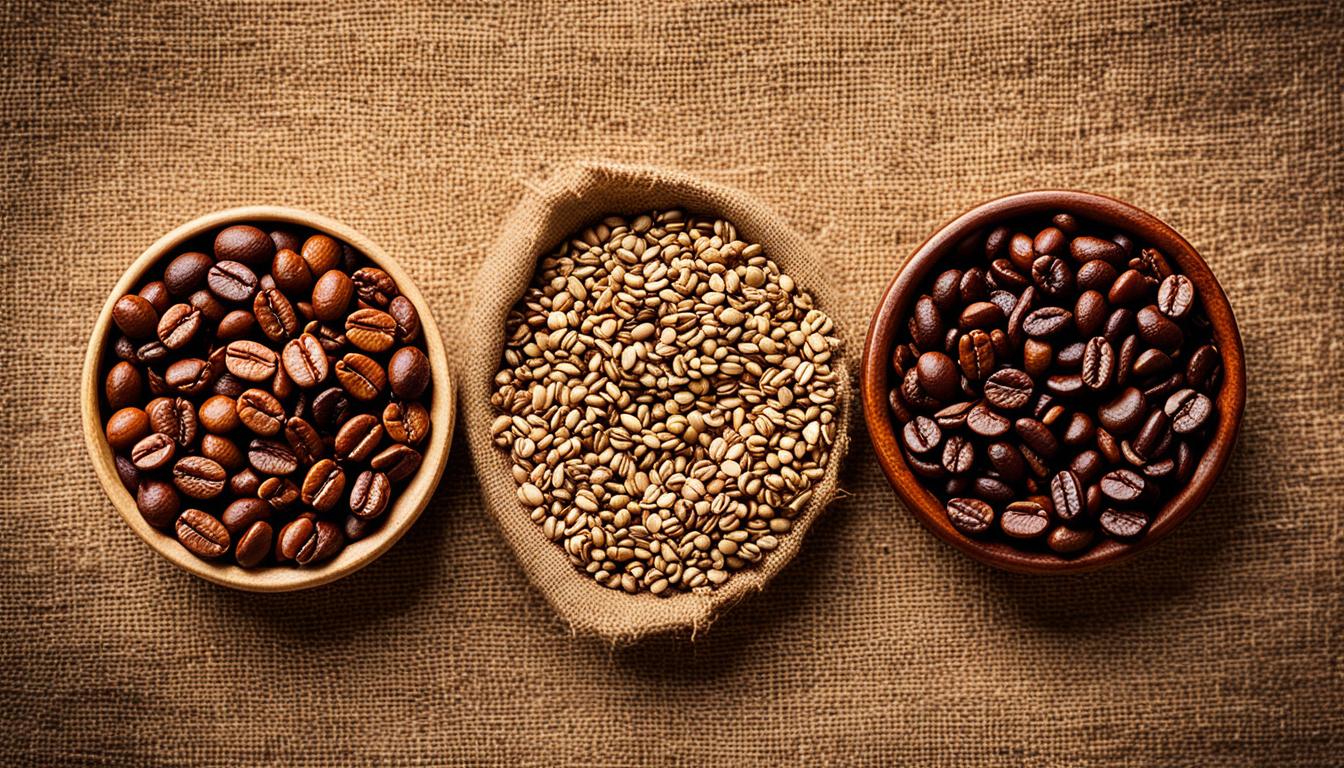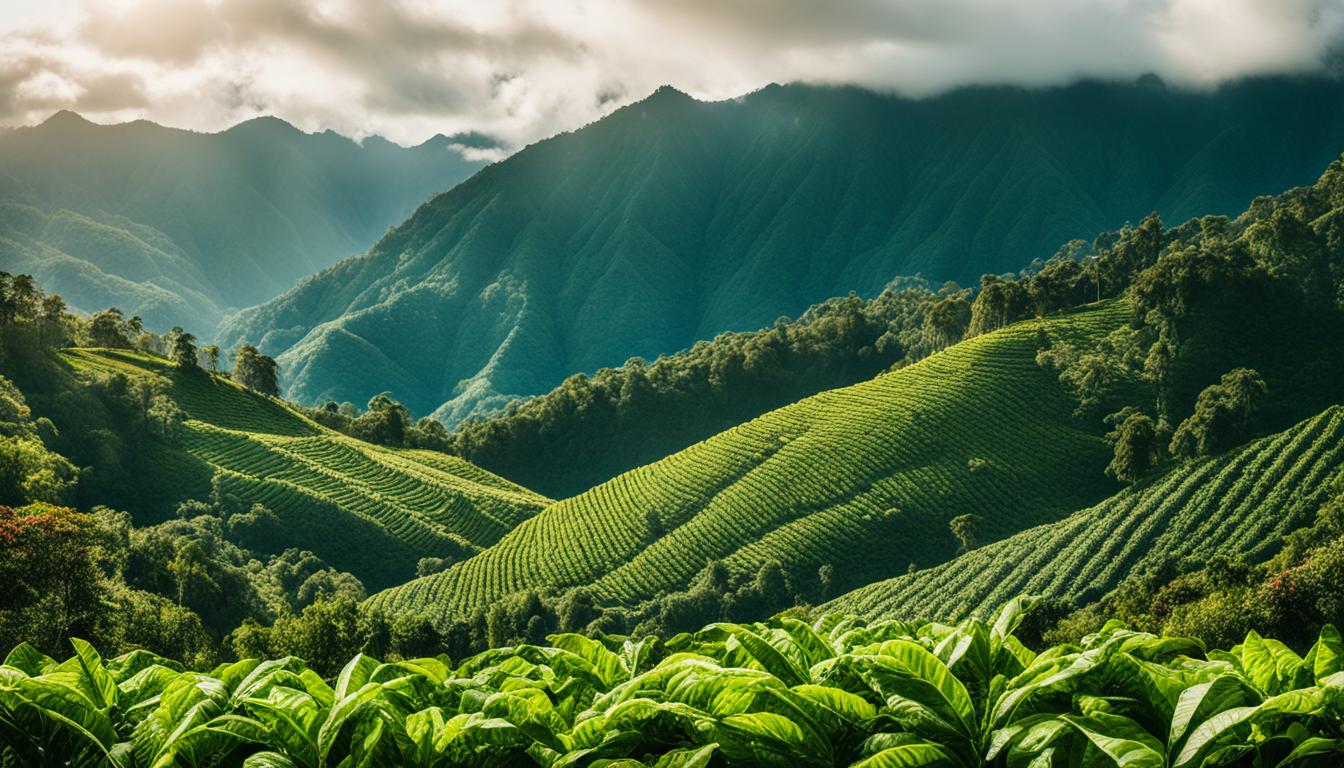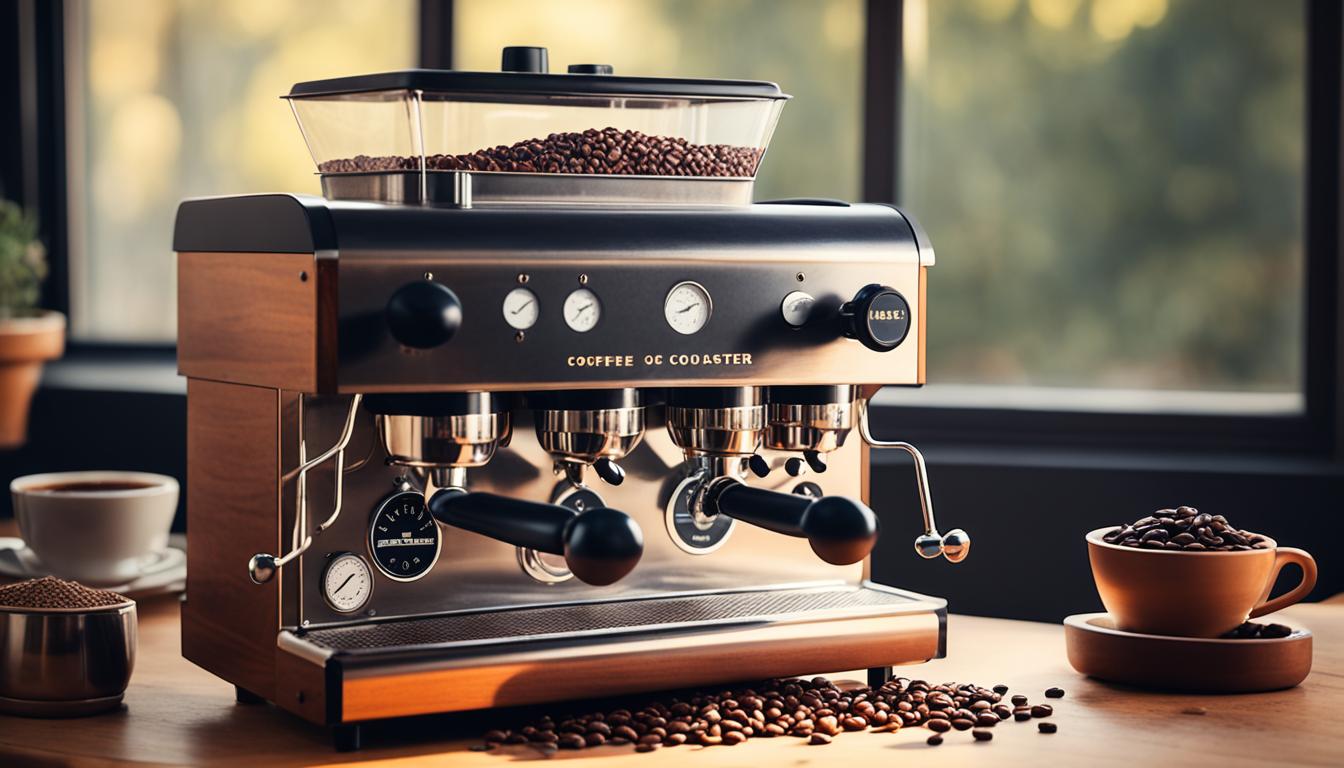Welcome to our coffee journey, where we dive into the fascinating world of Arabica coffee varietals. Arabica coffee is renowned for its exceptional taste and unique production methods. Grown at high altitudes in tropical regions, such as Central and South America, Africa, and Asia, Arabica beans offer a smoother, sweeter, and more nuanced flavor compared to other coffee types. With notes of fruit, chocolate, nuts, and caramel, they create a delightful sensory experience for coffee lovers.
Arabica coffee comes in various types, each with its own distinct characteristics. From different cultivars and species to a wide range of bean varietals, there’s a world of Arabica coffee varieties waiting to be explored. Join us as we explore the taste profiles and types of Arabica coffee varietals that will captivate your taste buds and elevate your coffee experience.
Key Takeaways:
- Arabica coffee offers exceptional taste and quality.
- It is grown at high altitudes in tropical regions.
- Arabica beans have a smoother, sweeter, and more nuanced flavor.
- They are lower in caffeine and more acidic.
- Arabica coffee comes in different cultivars, species, and bean varietals.
Arabica Coffee And What Makes It Special
Arabica coffee is renowned for its exceptional taste and undeniable quality. Grown at high altitudes in regions with a tropical climate, such as Central and South America, Africa, and Asia, Arabica beans are cultivated in ideal conditions that contribute to their distinct flavor profile.
Compared to other coffee types, Arabica coffee offers a smoother, sweeter, and more nuanced flavor that appeals to coffee enthusiasts worldwide. Each sip delights the palate with notes of fruity sweetness, rich chocolate, subtle nuttiness, and hints of caramel. It’s an unforgettable experience for those seeking a truly exceptional brew.
But the uniqueness of Arabica coffee goes beyond its taste. With lower caffeine content and higher acidity, Arabica coffee is known for being less bitter, making it a pleasure to drink. Its acidity enhances the flavors, creating a well-balanced and vibrant cup of coffee that keeps you coming back for more.
So, what sets Arabica coffee apart? Let’s take a closer look at its distinguishing factors:
- Exceptional Quality: Arabica beans are meticulously harvested and processed to ensure the highest quality standards are met. From the cultivation to the roasting process, every step is designed to bring out the best flavor and aroma.
- High Altitude Growth: Grown at elevated altitudes, Arabica coffee benefits from the cooler temperatures and nutrient-rich soil. This unique environment promotes slower bean development, resulting in a more complex and refined flavor.
- Tropical Climate: Arabica coffee thrives in tropical climates, where the consistent temperatures, ample rainfall, and moderate sunlight provide the perfect conditions for the cultivation of these exquisite beans.
- Nuanced Flavor: The flavor profile of Arabica coffee is truly remarkable. It offers a myriad of taste sensations, from bright and fruity notes to velvety chocolate undertones. This nuanced flavor is a testament to the meticulous care and craftsmanship that goes into its cultivation and processing.
- Aromatic Delight: The aroma of Arabica coffee is rich and enticing, captivating your senses from the moment you take your first whiff. The delightful fragrance further enhances the overall coffee-drinking experience.
“Arabica coffee represents the pinnacle of taste and quality. Its exceptional flavor profile, combined with the unique growing conditions, makes it truly special in the world of coffee.” – Coffee Connoisseur Magazine
Arabica coffee sets a high standard for coffee lovers seeking a cup of coffee that exceeds expectations. With its exceptional taste, quality, and captivating flavor notes, Arabica coffee has rightfully earned its place as the preferred choice for those who appreciate the finer things in life.
Exploring The World Of Single-Origin Arabica Coffees
When it comes to truly experiencing the unique flavors and characteristics of coffee, single-origin Arabica coffees are a connoisseur’s delight. Made from beans sourced from a specific geographic location, such as a single farm, estate, or region, these coffees offer a pure expression of the terroir and demonstrate the incredible diversity of flavor profiles that can be found within the Arabica species.
Each coffee-growing region around the world possesses its own distinct microclimate, soil composition, and altitude, influencing the growth and development of coffee plants. These factors contribute to the unique flavors and tasting notes exhibited by single-origin Arabica coffees. From the floral and fruity notes of Ethiopian beans to the earthy and chocolatey flavors of Colombian varieties, the flavor profiles are truly a reflection of their geographic origin.
One of the advantages of single-origin Arabica coffees is the transparency they offer. There is a clear focus on providing consumers with information about the origin and sourcing of the beans. This transparency allows coffee enthusiasts to appreciate the journey of the beans from the farm to their cup, fostering a deeper connection with the coffee-growing community and ensuring a more sustainable and ethical coffee industry.
Furthermore, single-origin Arabica coffees are often available as whole beans, allowing for fresh grinding just before brewing. This allows coffee lovers to customize the grind size and brewing method, unlocking the full potential of the unique flavors and aromas present in each batch. The result is a truly personalized coffee experience that showcases the pure expression of the beans.
Experience the world of single-origin Arabica coffees by exploring the flavor profiles and discovering the unique tastes from different coffee-growing regions. Whether you prefer a bright and citrusy cup from Kenya, a rich and bold brew from Brazil, or a delicate and floral sip from Costa Rica, single-origin Arabica coffees offer an array of options to satisfy diverse palates.
To help you navigate the world of single-origin Arabica coffees, we’ve compiled a handy table showcasing some popular coffee-growing regions and their flavor profiles:
| Coffee-growing Region | Flavor Profile |
|---|---|
| Ethiopia | Floral, fruity, tea-like |
| Colombia | Chocolatey, nutty, caramel |
| Costa Rica | Bright, citrusy, floral |
| Jamaica | Rich, complex, winey |
Explore these and more single-origin Arabica coffees to uncover the vast array of flavors that nature has to offer. Enjoy the journey of discovering the distinct character and nuances of each coffee-growing region, and savor the pure and unique tastes that single-origin Arabica coffees bring to your cup.
Unique Blends with Arabica Beans
When it comes to creating a well-rounded and satisfying cup of coffee, Arabica beans are highly sought after for their exceptional flavor profile. Coffee roasters carefully select these beans for their origin, altitude, processing method, and unique flavor characteristics in order to craft unique blends that cater to varying preferences and provide a balanced and complex taste experience.
Through the art of coffee blending, roasters expertly combine different Arabica beans, experimenting with ratios and roasting methods to achieve the desired flavor, aroma, body, and acidity. Each bean contributes its own unique qualities, resulting in a harmonious combination that creates a wonderfully balanced flavor profile.
By combining beans from different regions with distinct flavor notes, roasters can highlight specific characteristics and create exclusive signature blends that offer a truly unique and memorable coffee experience. These blends are often given special branding to showcase their exceptional quality and are crafted with careful attention to detail to ensure consistency and customer satisfaction.
“Coffee blending is a craft that allows us to showcase the best of Arabica beans and create blends that cater to every coffee lover’s palate.”
Exploring the Process of Arabica Bean Blending
Arabica blends are created through a meticulous process that involves selecting the finest beans, considering their flavor profiles, and skillfully blending them to achieve a remarkable balance of taste. Here’s a glimpse into the process:
- Bean Selection: Coffee roasters curate a collection of high-quality Arabica beans, taking into account their origin, altitude, and processing methods. Each bean brings its own unique characteristics to the blend.
- Flavor Profile Evaluation: Through careful tasting and analysis, roasters assess the flavor profile of each bean. They consider the notes of fruitiness, acidity, richness, and body to determine how they will complement one another in the blend.
- Ratio Experimentation: Roasters experiment with different ratios of beans, aiming to find the perfect balance that creates a harmonious flavor profile. This step requires precision and expertise to ensure consistency and excellence.
- Roasting Methods: Various roasting methods, such as light, medium, or dark roast, are employed to further enhance the flavor and overall character of the blend. Each method brings out different taste elements in the beans.
Through this careful process of bean selection, flavor evaluation, ratio experimentation, and roasting, Arabica blends are crafted to deliver a truly exceptional coffee experience. The result is a well-rounded cup of coffee with a balanced flavor profile that combines the best qualities of each bean.
A Taste Journey with Arabica Blends
Arabica blends offer coffee enthusiasts an invitation to embark on a delightful taste journey. With their unique flavor profiles and carefully crafted ratios, these blends promise a wonderful balance of sweetness, acidity, aroma, and body. Let’s explore some popular Arabica blends:
| Blend Name | Origin | Flavor Notes |
|---|---|---|
| Morning Energizer | Colombia, Brazil | Bright citrus, chocolate undertones |
| Velvet Mornings | Ethiopia, Guatemala | Floral, berry, honey-like sweetness |
| Exotic Spice | Indonesia, India | Spicy, earthy, with hints of cocoa |
| Sunset Serenade | Costa Rica, Kenya | Rich caramel, vibrant acidity |
These are just a few examples of the wide range of Arabica blends available, each offering a unique and captivating flavor experience. Whether you prefer a bright and fruity cup or a rich and bold brew, Arabica blends have something to satisfy every coffee lover’s palate.
Next time you’re seeking a well-rounded and flavorful cup of coffee, indulge in the exquisite blends crafted with the exceptional qualities of Arabica beans. Each sip will transport you to a world of enchanting tastes and aromas, tailored to delight and awaken your senses.
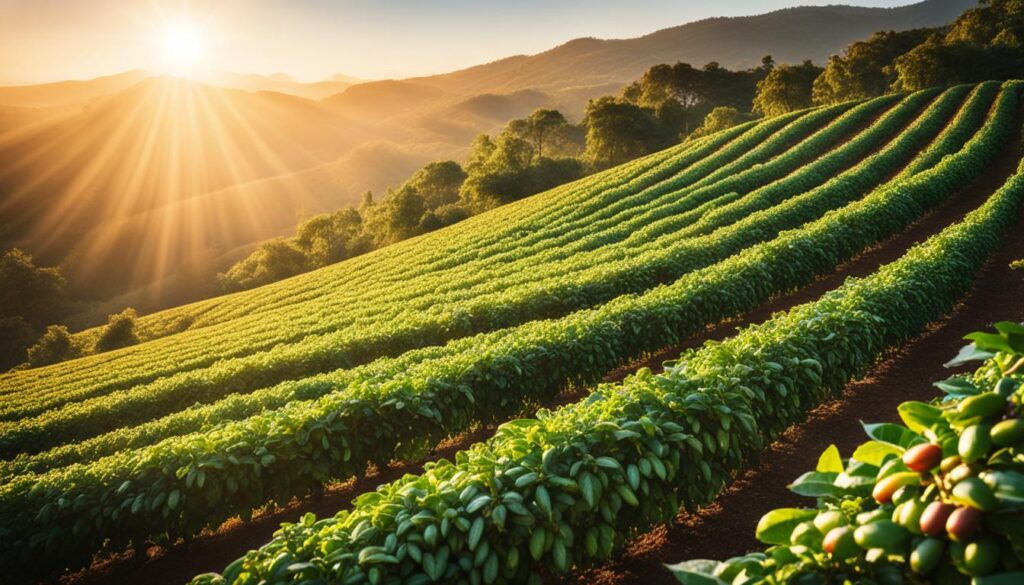
Key Benefits of Drinking Specialty Arabica Coffee
When it comes to coffee, specialty Arabica beans offer a world of enticing advantages. At every sip, you’ll experience a superior taste that indulges your palate with a diverse range of flavor profiles. From rich and chocolatey to fruity and floral, there’s something to satisfy every coffee lover’s preferences.
But the benefits of specialty Arabica coffee go beyond taste. Ethical sourcing is a top priority for many specialty Arabica coffee roasters and retailers. They are committed to fair wages, sustainable growing techniques, and organic certifications, ensuring that every cup you enjoy is a responsible choice.
Transparency is a fundamental aspect of the specialty Arabica coffee industry. When you savor a cup of this delightful brew, you can also relish in the knowledge of where the beans come from, how they were processed, and the unique flavor profile they offer. No secrets, just complete information to enhance your coffee experience.
Arabica coffee naturally contains lower levels of caffeine compared to other coffee varieties. So, if you like to savor the flavor without excessive stimulation, specialty Arabica coffee is the perfect choice.
Beyond the taste and quality, specialty Arabica coffee is embraced by a passionate community of coffee lovers. They are dedicated to the craft, fostering opportunities for learning, sharing tastings, and connecting with like-minded individuals who appreciate the art of a well-brewed cup.
Health Benefits of Specialty Arabica Coffee
Did you know? Specialty Arabica coffee offers potential health benefits, making it a wise addition to your daily routine.
- Antioxidants: Arabica coffee contains antioxidants that help protect your body from harmful free radicals and oxidative stress.
- Lower Acidity: Due to its naturally lower acidity, specialty Arabica coffee is gentler on the stomach, reducing the risk of digestive issues.
- Mood Booster: The aroma and flavor of specialty Arabica coffee can uplift your mood and provide a pleasant sensory experience.
- Heart Health: Consumption of specialty Arabica coffee has been linked to a reduced risk of heart disease and stroke.
Discover Community, Taste Excellence
By choosing specialty Arabica coffee, you become part of a vibrant community that appreciates the craft and the nuances of a perfectly brewed cup. Explore unique flavors, connect with fellow coffee lovers, and enjoy the unparalleled taste that only specialty Arabica coffee can offer.
Join us on this remarkable coffee journey and make every sip a moment of pure joy.
History and Characteristics of Arabica Coffee
Arabica coffee, also known as Coffea Arabica, has a rich history that dates back to its origin in Ethiopia. It is believed that Arabica coffee was first discovered and cultivated in the highlands of Ethiopia, where it grew naturally in the lush forests. The Ethiopian people recognized the potential of these coffee beans and began roasting and brewing them to enjoy the delightful flavors and aromas they had to offer.
Over time, Arabica coffee spread to other regions, including Yemen and the Arabian Peninsula, in the 7th century. Its popularity continued to grow, and it eventually made its way across continents through trade routes. Today, Arabica coffee is globally expanded and represents a significant portion of the world’s coffee production.
Arabica coffee thrives in regions with suitable climates and altitudes, such as Central and South America, Africa, and Asia. These growing regions provide the ideal conditions for Arabica coffee plants to flourish, resulting in high-quality beans with distinct characteristics.
One of the defining features of Arabica coffee is its taste profile. It is known for its high acidity, which adds brightness and liveliness to the cup. Furthermore, Arabica coffee typically has lower caffeine content compared to other coffee species, making it a preferred choice for those who are more sensitive to the stimulating effects of caffeine.
The taste of Arabica coffee can vary depending on factors such as the specific growing region, processing methods, and roasting techniques. However, it is generally characterized by its sweetness and nuanced flavors. Arabica coffee exhibits a wide range of tasting notes, including floral, fruity, earthy, and chocolatey, offering a delightful sensory experience with every sip.
Growing Regions of Arabica Coffee
Arabica coffee is primarily cultivated in regions with diverse climates and altitudes, which contribute to the development of distinct flavor profiles. Here are some of the prominent growing regions for Arabica coffee:
| Region | Description |
|---|---|
| Central and South America | This region includes countries like Brazil, Colombia, and Costa Rica, which are known for their high-quality Arabica beans. The coffee from this region often exhibits chocolatey and nutty flavors. |
| Africa | Countries such as Ethiopia, Kenya, and Tanzania produce Arabica coffee with vibrant fruity and floral notes, reflecting the continent’s rich biodiversity. |
| Asia | Popular Asian coffee-growing countries like India, Indonesia, and Vietnam produce Arabica beans with unique characteristics, ranging from spicy and earthy to sweet and herbal. |
These growing regions play a vital role in shaping the flavors, aromas, and overall quality of Arabica coffee, offering a diverse range of taste experiences for coffee enthusiasts around the world.
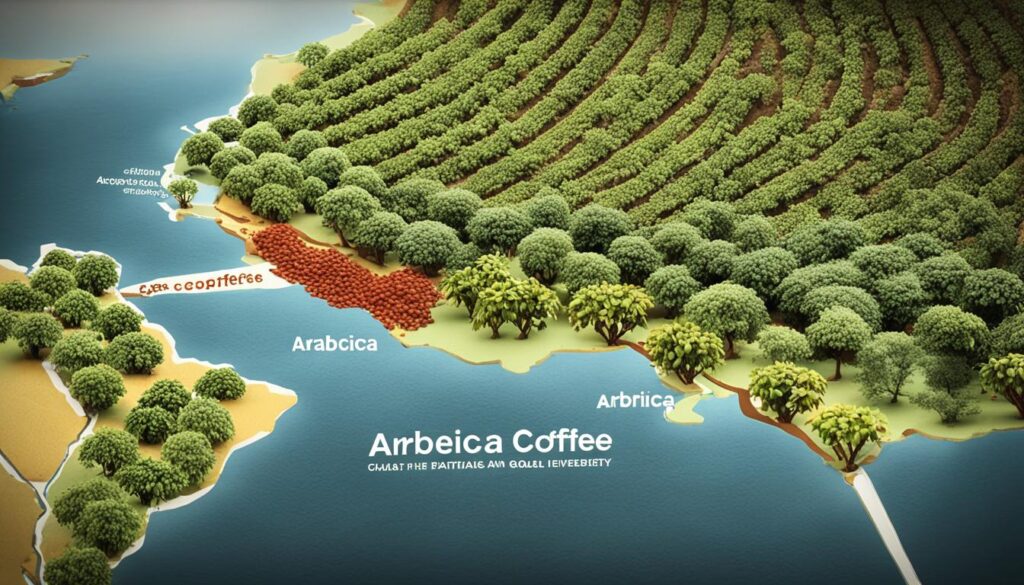
Conclusion
In conclusion, Arabica coffee offers a wide variety of taste options and high-quality experiences for coffee enthusiasts. Whether you prefer the distinct flavors of single-origin Arabica coffees or the well-crafted blends, Arabica coffee provides something to suit every palate.
Specialty Arabica coffee is especially noteworthy, as it offers superior taste, ethical sourcing, transparency, and potential health benefits. From the moment you take the first sip, you’ll experience the exceptional quality and unique characteristics that set Arabica coffee apart.
With its rich history and distinct characteristics, Arabica coffee has captivated coffee lovers around the world. The coffee’s journey from its origins in Ethiopia to its global expansion showcases its enduring popularity and appeal. The alluring taste, aroma, and lower caffeine content make Arabica coffee a preferred choice for those seeking a flavorful and satisfying cup of joe.
FAQ
What makes Arabica coffee special?
Arabica coffee is known for its exceptional taste and quality. It is grown at high altitudes in regions with a tropical climate, resulting in a smoother, sweeter, and more nuanced flavor compared to other coffee types. Arabica beans often have notes of fruit, chocolate, nuts, and caramel, and they are also lower in caffeine and more acidic, making them less bitter and easier to drink.
What are single-origin Arabica coffees?
Single-origin coffees are made from beans that come from a specific geographic location, such as a single farm, estate, or region. These coffees offer a diverse range of flavor profiles, allowing you to experience the unique characteristics and terroir of the coffee-growing region. They are often available as whole beans, providing the opportunity for fresh grinding and customization of the brewing process to highlight the distinct flavors of the coffee.
What types of blends can be made with Arabica beans?
Arabica beans are often used in coffee blending to create well-rounded and consistent cups of coffee. By carefully considering factors such as origin, altitude, processing method, and flavor profile, coffee roasters can craft blends that offer balanced and complex flavor profiles. These blends cater to different preferences and allow for control over taste, aroma, body, and acidity, resulting in a customized coffee experience.
What are the benefits of drinking specialty Arabica coffee?
Specialty Arabica coffee offers several key benefits. First, it is known for its superior taste, with a wide range of flavors to satisfy different preferences. Additionally, many specialty roasters prioritize ethical sourcing, ensuring fair wages, sustainable growing techniques, and organic certifications. These coffees also offer transparency, with detailed information about origin, processing, and flavor profile available to consumers. Specialty Arabica coffee is naturally lower in caffeine and may offer potential health benefits. Finally, the specialty coffee community provides opportunities for learning, tastings, and connections with like-minded individuals.
What is the history and characteristics of Arabica coffee?
Arabica coffee originated in Ethiopia and is believed to have spread to Yemen and the Arabian Peninsula in the 7th century. Over time, it has expanded globally and represents a significant portion of the world’s coffee production. Arabica coffee is primarily grown in regions with suitable climates and altitudes in Central and South America, Africa, and Asia. It is known for its high acidity and lower caffeine content compared to other coffee species. Arabica coffee has a sweet and nuanced flavor profile, with notes ranging from floral and fruity to earthy and chocolatey.

